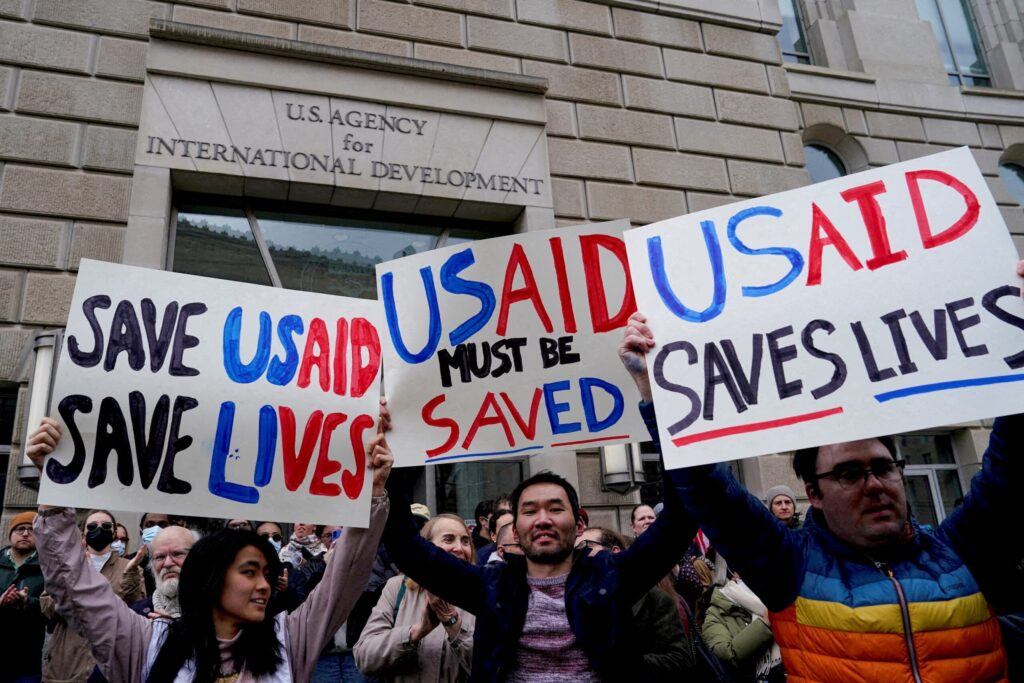The furore around USAID and questions around the legality of the aid body’s shutdown and possible resurrection have combined to create an atmosphere of confusion and disbelief which has come to define the second Trump administration.
When the Department of Government Efficiency, spearheaded by Elon Musk, began its purge of federal agencies, the world’s richest man announced on his social media platform that USAID was beyond repair. He called it “a criminal organisation” and “a viper’s nest of radical-left Marxists who hate America”.
These “Marxists” provided food aid, emergency healthcare, funding for hospitals and access to water in the most deprived parts of the world. The organisation also invested heavily in educational and economic initiatives, especially in the Middle East.
In the region last year, USAID spent $4.2 billion, around $2 billion of which went to humanitarian aid mostly in Gaza, Iraq, Syria and Yemen. About $1 billion was spent on economic development, helping to create jobs in places like Egypt and Jordan.
Over the past decade USAID has been instrumental in supporting the startup ecosystem of the Middle East by establishing funds, incubators and accelerators in what is a nascent market.
It was behind some of the earliest investment vehicles in Lebanon, Palestine and Iraq and backed a plethora of different initiatives to support entrepreneurs.
In Jordan it launched the USAID Business Growth Activity, helping the country’s SMEs improve productivity and competitiveness and to access new markets. It opened a Business Inclusion Hub to provide operational support and programmes for entrepreneurs and businesses with a special focus on young people, women and people with disabilities.
It funded projects like DAWERR, which operates in Lebanon’s waste management sector. In Egypt it funded an accelerator programme in partnership with the Information Technology Industry Development Agency and formed a partnership with Modus to launch a venture builder.
A fair amount of its economic development work in the Middle East was made possible through initiatives it funded through CrossBoundary, an investment and advisory firm operating in underserved markets.
US soft power
A few years ago I was invited by the CrossBoundary team in Iraq to an evening of networking at the Textile Museum in Erbil’s famed citadel, a monument to the long human presence in this part of the world.
As the team merrily drank wine with local Iraqi and Kurdish startup founders, it was clear that this was not simply a networking event. It was US soft power at play, bringing like-minded people (most of whom already were familiar with one another) together.
The Americans were the kingmakers that night and the local business founders were keen to establish a connection with them.
In Iraq, USAID, through CrossBoundary, was one of the first international bodies to establish a presence in the startup space. If the dismantling of USAID had taken place five years ago the local ecosystem would have suffered, according to one entrepreneur I spoke with.
In its absence, there are plenty of other organisations which can take its place and wield their own soft power in the region. The likes of the IFC, World Bank, Deutsche Gesellschaft für Internationale Zusammenarbeit and both regional and local banks provide advisory and financial support as well as incubators and accelerators.
Moreover, there is a strong argument to be made for a reduction of aid money to startups.
Grants and aid money hinder progress in establishing a local VC ecosystem. It gives the false impression that the startups are more like charities or social enterprises, rather than legitimate, profit-making or high growth businesses.
The absence of USAID will certainly be felt in the startup space but it will not be as devastating as its loss in the humanitarian space in the region.
Triska Hamid is a writer who focuses on technology and startups in the Middle East and an angel investor
Register now: It’s easy and free
AGBI registered members can access even more of our unique analysis and perspective on business and economics in the Middle East.
Why sign uP
Exclusive weekly email from our editor-in-chief
Personalised weekly emails for your preferred industry sectors
Read and download our insight packed white papers
Access to our mobile app
Prioritised access to live events
Already registered? Sign in
I’ll register later



